Addison County Interfaith Affordable Housing Alliance Efforts
“Housing is absolutely essential to human flourishing. Without stable shelter, it all falls apart.” Matthew Desmond, author of Evicted: Poverty and Profit in the American City
The bad news: We have a housing crisis in Addison County.
The good news: You can explore & support solutions.
YOU CAN HELP EASE THE HOUSING CRISIS Spread the word among your friends, family and neighbors in Addison County. Housing advocates say that only about 1,000 people in Addison County know about these resources. 1) HomeShare Vermont 2) Accessory Dwelling Units (ADU) 3) Homes First (Tiny Homes).
Resuming Monday Sept 1 at 7 pm in Fellowship Hall and on zoom.
AC Interfaith Affordable Housing Alliance Brochure 3.25
AC Interfaith Affordable Housing Alliance Display Poster

LOOKING FOR…Middlebury Resources & Services WINTER March 2025
HomeShare Vermont
For over 40 years, HomeShare Vermont has been matching people who have room in their homes with those seeking an affordable place to live. Time and care is taken to create a compatible match between host and guest and HomeShare Vermont provides ongoing support throughout the length of the match. HomeShare Vermont hosts consistently say they feeler safer and are happier because of their home share match. Contact: HomeShareVermont.org. Contact Connor Timmons info@HomeShareVermont.org (802) 863-5625 or visit https://www.homesharevermont.org or see Abi Sessions, Ellen Flight or Connie Kenna.
Homes First (Tiny Homes)
We seek to provide economically and environmentally sustainable “right-sized” homes to Addison County residents, that are designed and funded, fully or in large part, by the community that resides alongside them. Currently partnering with Hannaford Career Center to build the first affordable, well-built, 250+ sf home of hopefully many to come. We envision neighborhoods of right-sized homes, 300-500 square feet, within the village and city centers of Addison County, to take advantage of public transportation and services. We would also consider placing a single tiny home on suitable lots throughout Addison County. Contact: Homes First https://homesfirstvt.org ( 802) 398-5491 or see Jean Terwilliger.
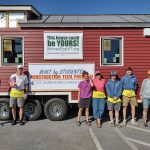 Many toured the tiny home built by the Hannaford Career Center when it was in the lot of the Counseling Service of Addison County at Cross St and Main St for 2024 Memorial Day weekend and open during the Middlebury Memorial Day parade. You could buy it for $65,000. Proceeds went toward building the next one. Alliance members and their friends have pitched in to help with construction on work days and are mulling more work days to build out tiny houses and ADUs akin to the Habitat for Humanity model and inviting their volunteers to help and other displays of the Tiny House. A retired contractor with volunteers hopes to build one this summer. Contact Homes First if interested in helping to build it. Must have access to town water. Cost is just for materials. Labor is free.
Many toured the tiny home built by the Hannaford Career Center when it was in the lot of the Counseling Service of Addison County at Cross St and Main St for 2024 Memorial Day weekend and open during the Middlebury Memorial Day parade. You could buy it for $65,000. Proceeds went toward building the next one. Alliance members and their friends have pitched in to help with construction on work days and are mulling more work days to build out tiny houses and ADUs akin to the Habitat for Humanity model and inviting their volunteers to help and other displays of the Tiny House. A retired contractor with volunteers hopes to build one this summer. Contact Homes First if interested in helping to build it. Must have access to town water. Cost is just for materials. Labor is free.
Homes First is focused on serving low-income single people, including those who have experienced homelessness, in very small affordable units ($85,000- $100,000 for the first one once hooked up to services) with a Habitat-like model. The CVUUS housing group is trying to serve a similar group because there is a big need, with discussion of how to help young people stay in their communities after they graduate.
https://www.npr.org/sections/health-shots/2022/02/06/1077791467/tiny-homes-big-dreams-how-so[…]les
https://thetinylife.com/tiny-homes-for-homeless/
Accessory Dwelling Units (ADUs)
An accessory dwelling unit (ADU) is limited in size to the greater of 900 square feet or 30% of the primary dwelling. It may have any number of bedrooms but must be clearly subordinate to the main structure. It is a self-contained, independent housing unit complete with a kitchen, bathroom, living space, and permanent utility connections (water, sewer, electric). It can be attached or detached to the primary home. Contact: Adam Lougee, Director of the Addison County Regional Planning Commission (802) 388-3141. Basic Info: https://accd.vermont.gov/adu Addison County Guide: https://acrpc.org/regional-programs/housing/ or see ADU developers Mike Small, Colleen Brown, and Chris Murphy or their builder Scott Barkdoll.
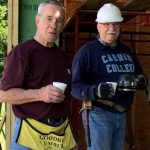 Habitat for Humanity
Habitat for Humanity
Focuses on building for low-income families. Habitat for Humanity of Addison County has a stable volunteer builder group (including Bob House) and appreciates volunteers and donations. They’re currently working on units at Gorham Lane in Middlebury and finishing up in Booth Woods in Vergennes and worked on ones on Seymour St in Middlebury. The alliance has wondered how it could enlist its volunteers in other affordable housing projects like building AUDs or tiny homes or rehabs. Mary Hadley, Alan Moore, Neil Chippendale, Rich Wolfson, Terri Arnold and other CVUUSers have volunteered at various times.
Addison Housing Works (formerly ACCT)
Addison Housing Works works mostly through the standard state and federal funding streams that help create 1-3 bedroom apartments in multi-family buildings (typically costing $300,000+ per unit), and also manages the mobile home parks it owns (no additional space available). See details here on their 35 years of accomplishments from their early days in 1989 as a Community Land Trust to ACCT to Addison Housing Works today where the Firehouse Apartments in downtown Bristol are their most recent one. Come to their celebration on Fri Sept 13, 2025 at Bristol Town Green or talk with John Barstow who serves on their board. The alliance applauds their efforts and wonders how it can help them with Single Resident Occupant (SROs) boarding houses staffed by social services.
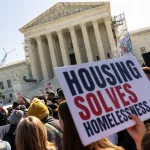 Addison County Housing Coalition
Addison County Housing Coalition
The alliance appreciates that this long-standing coalition convenes local stakeholder nonprofits on the first Thursday of the month at the United Way of Addison County offices off Boardman St and zoom at 2:15 pm. It is currently led by John Graham Shelter executive director Susan Whitmore. It organized a Homelessness Awareness Day on Jan 19, 2023 and again on May 5, 2025 and hosts a Homelessness in Addison County website to learn more about our housing crisis and what you can do. Tom Morgan attends on behalf of community ministry as do Connor Timmons on behalf of HomeShareVT, Kerri Duquette-Hoffman on behalf of VT Dept of Health and Laura Asermily on behalf of the Town of Middlebury. For more, talk to them or contact
Susan Whitmore – 802-257-6771 or via email at susan@johngrahamshelter.org.
Mark Demers – 802-388-2285 or via email at mdemers@cvoeo.org
Homelessness Awareness Day
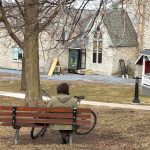

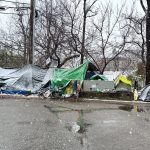 The Addison County Housing Coalition invited community members to participate in the Addison County Homelessness Awareness Day action to commemorate Vermont Homelessness Awareness Day. This event honored the 143 adults, children, and elders who are currently unhoused in Addison County and reaffirms the community’s commitment to ending homelessness in the region.We were invited to join our neighbors on the Middlebury Green between 7:45 AM and 1:30 PM on May 5, 2025. Advocate Mathew Clouser, a Charter House Case Manager, shared the following on Front Porch Forum:
The Addison County Housing Coalition invited community members to participate in the Addison County Homelessness Awareness Day action to commemorate Vermont Homelessness Awareness Day. This event honored the 143 adults, children, and elders who are currently unhoused in Addison County and reaffirms the community’s commitment to ending homelessness in the region.We were invited to join our neighbors on the Middlebury Green between 7:45 AM and 1:30 PM on May 5, 2025. Advocate Mathew Clouser, a Charter House Case Manager, shared the following on Front Porch Forum:
“Not many would argue that homelessness isn’t an issue nationally or worldwide. Yet, in America, little is being done at the highest levels. We spend resources to posture and politicize rather than committing ourselves to the logical, compassionate, financially advantageous solutions we already have at our disposal.
I’m speaking of things like Housing First, which has an excellent track record virtually everywhere it’s been prioritized, and it’s proven much cheaper than motel vouchers, hospital stays, mental institutions, incarceration, rehab beds, and other options that amount to no more than overpriced band-aids.
There’s never a good time to cut benefits and social services, yet I see us doing it more frequently—nationally and locally— often in the name of lower taxes. There’s far too little conversation about how tax money can be used for positive investment in our communities and future. We don’t talk enough about the hidden costs of lowering taxes, either.
For example, the extra burden we put on social workers, medical staff, first responders, schools, businesses, and public institutions, all of which are already often pressed beyond their current capabilities. This is to say nothing about the human cost involved for those in need. Not only are the unsheltered dehumanized by our general lack of attention to their lives and burdens, but we can also create more crime and suffering through enacting certain encampment policies and laws that don’t also create positive solutions and opportunities for outreach and engagement. Any policy which only discourages the presence of the unhoused serves to alienate them further, pushes them further into the shadows, and should be avoided. These problems won’t disappear via migration; they will grow and manifest anew in places less prepared and where it will be more difficult, and more expensive, to give aid.
Furthermore, if we want to lower crime, we should be doing whatever we can to lower poverty rates in general, not exacerbate them by cutting social services— this only puts more people in the precarious position where committing crime can become a necessary, reasonable option for survival.
There are many overwhelming, factually inaccurate stigmas attached to the homeless, especially the idea that they’re mentally ill, addicted, or in some way dangerous or violent. While it’s true that some fall into those categories, it’s also true that none of these issues are limited to any class or population, and the statistics show the unhoused are much more likely to be victims of crimes than to commit them. It’s too easy to make people into scapegoats and chalk their problems up to moral failures or personal insufficiencies. We have huge systemic problems, and this kind of victim blaming is but a distraction that won’t help them get solved.
The people I serve are overwhelmingly good, hardworking folks who have been dealt a bad hand. They’ve fallen through so many cracks, have been failed or blatantly ignored by so many people in so many positions over so many years, that I’m frequently astounded they continue to fight for themselves.
Yet they do show up, even when that means navigating a system so splintered and inefficient that it feels draconian. I say draconian because that’s what it feels like for me, simply in going through the process of being an advocate. I don’t have to deal with the added stress and trauma of being on the streets, and don’t realistically have to worry if I’ll be accosted at any moment by bad actors or local officials seemingly more concerned about appearances than solutions.
I urge everyone not to look the other way. Most of us are so close to being unhoused if things go wrong. Should that happen, we’d all wish we’d done more when we had the chance, so please ask your representatives, local and national, to make fixing the homeless crisis a priority. Investigate models like Housing First, as well. I think you’ll see the success Housing First has shown and ask, Why can’t we do more of this here? Why AREN’T we doing more of this here when it’s so much more effective, compassionate, and financially advantageous, particularly as we find ourselves so concerned with efficiency in the national discourse? The model is good for our hearts AND for our wallets.
I also urge you to remember that the unsheltered people you may encounter are as human and valid as you or anyone else. They’re someone’s child, someone’s loved one, perhaps someone’s sibling or parent—they have hopes and dreams, too.
They deserve to live in peace and shelter, regardless of any challenges they may have. They deserve dignity and respect; a smile, a wave, a hello—at the very least. They’re not the problem or burden so many would have you think they are. A little kindness goes a long way. Take the time to get to know these folks, and you may, like me, find yourself continually inspired by their courage, perseverance, and resilience. May we all be so strong”
From Tom Morgan: Homelessness in Vermont increased by at least 18.5% between 2023 and 2024. (Based on the HUD “point in time” (PIT) survey conducted Jan 24/25, 2024. the HUD method/process resulted in an undercount of the actual unhoused members of our communities, which recorded an 18% increase between 2023 & 2024. Vermont has experienced an almost 200% increase since before COVID. Intersectional-associated community maladies (e.g., untreated mental illness, substance disorders, drug-related incarcerations, etc. are also increasing in Vermont).
Just Getting By Film Screening
Bess O’Brien’s new documentary film Just Getting By was screened at CVUUS on Saturday Sept 21, 2024 hosted by CVUUS and Middlebury College’s Center for Civic Engagement as part of its Clifford Symposium. Preceded by an opportunity to visit with housing solutions-related organizations. See a trailer here.
Background
Addison County Interfaith Affordable Housing Alliance formed in 2022 to educate faith groups and our community about these options. Contact leaders Mike Greenwood or Jean Terwilliger for more. Recognizing that new housing developments like the one proposed for Seminary Street Extension in Middlebury are several years away from occupancy and that the housing need is urgent, some members of the CVUUS Race in America Caste book discussion group(Jean Terwilliger, Mike Small, Scott Barkdoll or Mike Greenwood) began convening in winter 2022 to inquire on what could be done to address the housing crisis. They aimed to meet on the first Monday of the month at CVUUS, sometimes with a Zoom option. It began with fact finding and brainstorming.
- Review Homelessness Awareness in Addison County
- Scan Affordable Housing in VT Report 2021.
- Explore a Middlebury tiny house.
- Read LP#44_ How Vermonts Housing Crisis Got So Bad
- Learn about the status of Bill S. 100 on Affordable Housing
“Ideas ranged from helping families move into homes with the first month rent and moving expenses paid to converting garages and perhaps even barn spaces into apartments,” reported Mike Greenwood who oversees the discussions with Jean Terwilliger.
CVUUS explored partnering with organizations, such as Homes First VT, a small group of community members whose vision is a village of “right-sized” homes referred to as Tiny Homes. Homes First VT seeks land for this with a community gathering space situated within walking distance of the bus line in Addison County. This is very intentionally an alternative to the affordable housing developments constructed by Addison County Community Trust and Summit Properties. Their goal is to build homes by the community, one by one. Hannaford Career Center has agreed to build one Tiny Home per year for as long as Homes First VT is the “middleman.” The public will have an opportunity to view the first tiny home in the Middlebury Memorial Day Parade.
In February CVUUS welcomed other area faith groups and local organizations to brainstorm, forming the Interfaith Affordable Housing Alliance. It considered how to incentivize the growing number of homeowners with Air B&Bs to convert to long-term rental. There are over 100 short-term rentals in Middlebury. Faith groups learned that HomeShare VT, Charter House, CVOEO and other agencies are good resources for supporting landowners with lease and tenant guidelines and support. Some considered how to mobilize Habitat for Humanity volunteers and others in constructing a tiny home over the summer. It recognized that Addison County Housing Coalition convenes local stakeholder nonprofits monthly and that it organized a Homelessness Awareness Day in January and launched a Homelessness in Addison County website for residents to learn more about our housing crisis and what could be done.
Importantly, February’s attendees learned about exciting progress being made by St. Stephen’s Episcopal Church on advancing ADUs (Accessory Dwelling Units) to help create an apartment on your property. St. Stephen’s has been getting the word out that homeowners can apply for a state grant of up to $50,000 from VT Housing Improvement Program (VHIP). This is administered by Neighborworks of Western Vermont for Addison and Rutland county residents.
“This is a great program,” said Mike Small, a CVUUS member and Sudbury property owner who will share his experience creating an ADU at the June 4 community conversation.
The state’s ADU grant requires a homeowner match of $10,000 to access it. Up to six homeowners can get up to $5,000 from St. Stephen’s on a first come basis to help meet this match. The Addison County Regional Planning Commission will help administer this grant and is preparing a comprehensive ADU guide. “We’re providing a flowchart that helps you decide if an ADU is right for you,” offered ACRPC’s Adam Lougee who will provide an overview of the guide at the community conversation and hold ADU workshops to assist homeowners ready to take next steps.
If ADUs are not right for you, another great option might be HomeShare VT which matches homeowners with tenants who can offset their living expenses and provide care and companionship. Speakers will be on hand to explain their experience with HomeShare VT’s vetting process which includes background checks, arranging a meeting, designing a lease agreement, and piloting it for two weeks before making things more final.
HomesFirstVt has presented twice at CVUUS over the past years so is familiar with it and supports it. In addition, the alliance recognized that several congregants volunteer for Habitat for Humanity of Addison County and serve on the Addison Housing Works board (formerly Addison County Community Trust or ACCT board). Several also promote HomeShare VT and have worked on advancing weatherization efforts and the state’s climate bill in targeting rehab and building more multifamily homes.
Community Conversations Hosted: The Interfaith Affordable Housing Alliance realized it wanted to advance three priorities: HomeShare VT, Tiny Homes, and ADUs. They approached Rev. Andy Nagy-Benson and Emily Joselson about spearheading a community conversation on housing solutions in a fashion similar to earlier ones they convened on essential topics for Middlebury and Addison County and they agreed to host the June 4 gathering.
Close to 60 came to the first community conversation held at the Congregational Church of Middlebury, UC on June 4, 2023 with testimonial stories and breakout sessions as desired. The alliance hosted a second one there on a rainy Oct 29, 2023 that included a tour of a tiny home bus and a third one on Sunday June 9, 2024 at St. Peter’s Parish Hall in Vergennes. A fourth one was held in Bristol on Sunday May 18 at the Fire House Apartments community room.
First Session (Nov 28, 2022): Ideas ranged from helping families move into their home with the first month rent and moving expenses paid to converting garages and perhaps even barn spaces into apartments. We also talked about partnering with organizations that are also doing good work in this area and demographics. Who do we want to support?
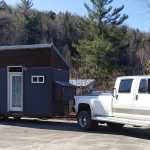 Second Session (Jan 9, 2023): We learned more about Homes First VT, a group of 7-10 members who meet regularly to generate and leverage community partnerships in order to alleviate our housing crisis. This includes CVUUS member Jean Terwilliger. Their long term vision is a village of 9-12 “right-sized” homes with a community gathering space situated within walking distance or on the bus line in Addison County. This is very intentionally as alternative to the affordable housing developments. Their short term goal is to build homes by the community, one by one. Hannaford Career Center has agreed to build one per year for as long as HomesFirst VT is the “middleman.”
Second Session (Jan 9, 2023): We learned more about Homes First VT, a group of 7-10 members who meet regularly to generate and leverage community partnerships in order to alleviate our housing crisis. This includes CVUUS member Jean Terwilliger. Their long term vision is a village of 9-12 “right-sized” homes with a community gathering space situated within walking distance or on the bus line in Addison County. This is very intentionally as alternative to the affordable housing developments. Their short term goal is to build homes by the community, one by one. Hannaford Career Center has agreed to build one per year for as long as HomesFirst VT is the “middleman.”
Third Session (Feb 6 2023): We welcomed other faith groups in join us. We learned about some exciting progress being made by St Stephen’s on advancing ADUs (Accessory Dwelling Units) to help create apartments on your property. They are getting the word out that homeowners can apply for up to $50,000 from VT Housing Improvement Program (VHIP) administered by Neighborworks of Western Vermont for Addison county residents. They can also get up to $5,000 from St. Stephens administered by Addison County Regional Planning Commission to cover initial costs. St Stephen’s reported that ACRPC would like to hold workshops at ACRPC about it. We offered CVUUS as a larger venue. CVUUS’ Mike Small is prepared to tell his story about an ADU he is building right now with VHIP help. We’d like to host an Addison County Housing Summit this spring (early May?) to help get the word out about how to go about creating accessory dwelling units (ADU) with this available funding, raise money for affordable housing, and also share how to reduce energy costs for low income households. Important to have good stories/case studies to share. Are there houses we know of that could host small units? How much time/energy/money do we (CVUUS) have to contribute to existing projects or start new ones? We mulled how to incentivize the growing number of homeowners with Air B&Bs to convert to long-term rental. There are over 100 in Middlebury. HomeShare, Charter House, CVOEO and other agencies may be good resources for supporting landowners with lease and tenant guidelines and support.
Fourth Session (March 13, 2023): We presented 10 areas that were mentioned most based on ideas generated at our Feb session. From the 10, we selected 4 to work on. The criterion for selection was a goal/action that could be fully or partially completed in the next six months or by September 2023. Individuals then self-selected which area they wanted to focus on and met in small groups.
Accessible Dwelling Units (ADUs)
HomeShare
Tiny Houses/Small Footprint Homes
Fifth session (April 3, 2023): This was an opportunity for our groups to meet and continue their work. We decided we wanted to proceed with scheduling a Community Conversation: Housing Solutions for Sun June 4 and proposed 3-5 pm in Congregational Church of Middlebury Unity Hall since we imagine breakouts and some media (showing a clip about Tiny House). We asked ourselves how to communicate who is hosting this and proposed “Interfaith Housing Solutions.” We wondered what the hook would be and decided to lead with “Your Home Could Help Solve Our Housing Crisis.” While the mock-up pic adds “network,” we opted to drop that since it is implied. (Someone noticed that the initials “IHS” also stand for “Christ” which we hope blesses this effort for good outcome!) We aim to have a “story-telling” panelist for each of the 3 areas on which we seek to focus:
- ADUs (Rebecca Burton and Mike Small interviewed by someone from our group)
- HomeShare (an Addison County couple interviewed by someone from HomeShare volunteer/staff)
- Tiny House Lot Permission (video clip with someone from Homes First VT introducing it and answering questions). We’ll reference Hannaford Career Center tiny house that will be on display in the Middlebury Memorial Day Parade that needs to be placed. HCC is willing to build one tiny house per year for Homes First VT which seeks property on which to place them.
We didn’t settle on the order though some proposed starting with the Tiny House media clip since it sets the stage for expressing the housing need. We plan a resource sheet that people can take and inviting contractors who we have learned are interested in doing ADUs so they can connect with homeowners who may be ready to proceed as well as other stakeholders. St Stephen’s is working with ACRPC to produce a Guide to ADUs and will have it ready for June 4.
Sixth Session (May 1, 2023): Finalize plans for our Community Conversation for June 4.
Community Conversations. june 4. handout (1)
Oct 2024: We repeated our Community Conversation on Oct 29 including a tour of the tiny house.
Jan & Feb 2024: We mulled ways to continue spreading the word about our three affordable housing options with residents and elected officials and making headway on zoning regulations toward locating a tiny house village. Affordable Housing Coalition action january 2024


